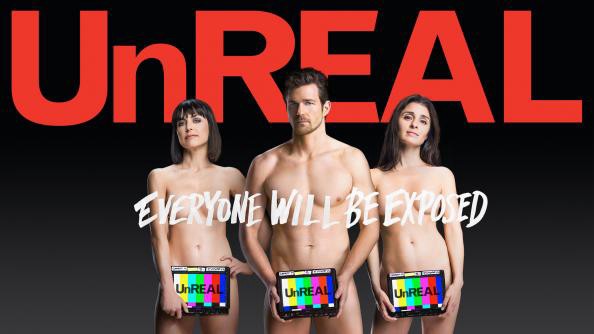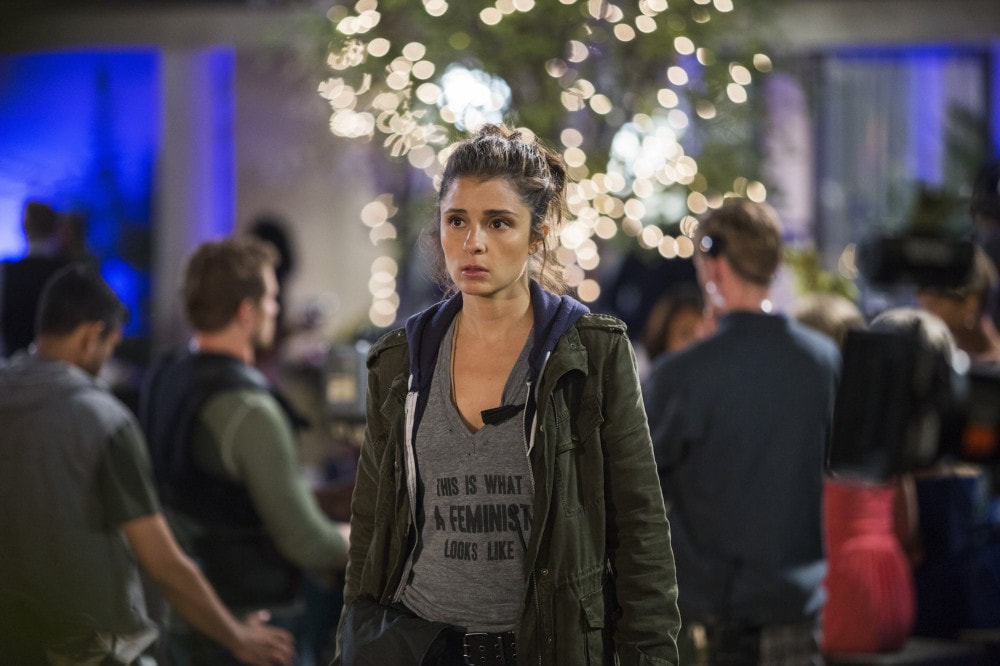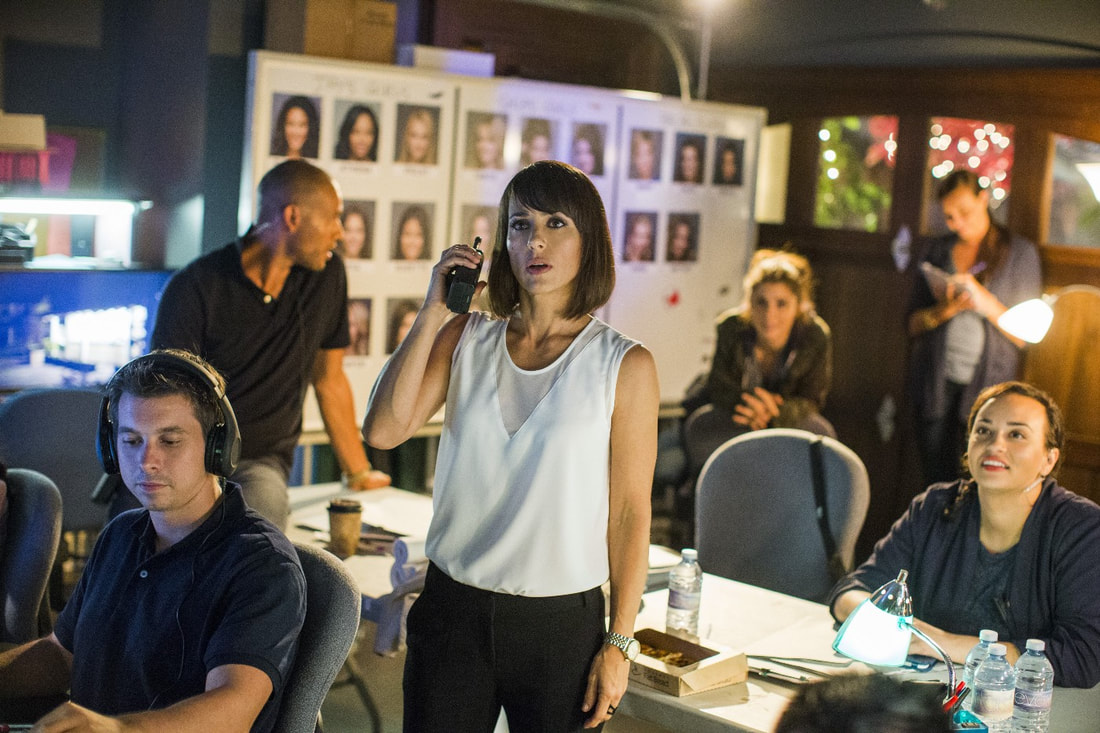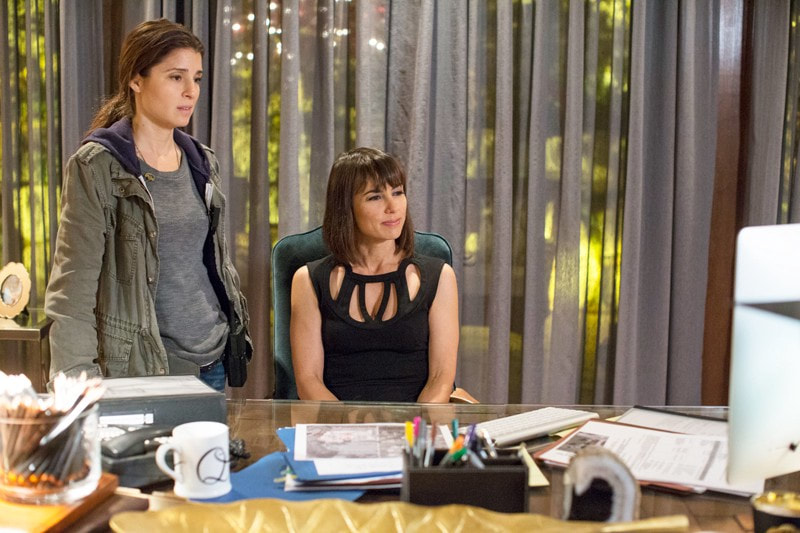|
The mantra spoken by the female stars of UnREAL in their Season 2 promo could just as easily be Lifetime’s new catch-phrase as they attempt to use this show to rebrand their network based on “Television for Women” as something darker and sexier — hoping to appeal to a wider audience. (Ahem, men.) When UnREAL premiered on Lifetime last summer no one believed that a show that seemed like nothing more than a parodic meta-commentary on The Bachelor would be anything other than fantasy fodder for lonely housewives desperately searching for a soap opera replacement. Instead, it’s become a critically acclaimed media sensation, highlighting issues of sexism and racism in the television industry, as well as commenting on the questionable construction of reality TV, and exploring how one might lose their sense of right and wrong in such an environment. Not to mention the complexities of love in romance in the 21st Century — especially when influenced by substance abuse, mental illness, greed, or lust. It’s fresh, scathing, and binge-worthy. Created by well-known television writer/producer Marti Noxon (of Buffy the Vampire Slayer fame) and Sarah Gertrude Shapiro (a former producer on The Bachelor), UnREAL is truly created by strong female showrunners about strong female showrunners and it’s self-reflexiveness and gender commentary is unmatched by any other show on television right now. Shiri Appleby plays Rachel Goldberg, a brilliant producer for a fictional reality romance show Everlasting, who fights continuously between feeling guilty about her manipulative actions and impressing her headstrong, take-no-prisoners, ball-busting boss Quinn King (Constance Zimmer) who wants nothing more than salacious story lines and is willing to ruin anyone to get them. In Season 1, Rachel finds herself in a love triangle between her cameraman ex-boyfriend Jeremy (Josh Kelly), and the “suitor” of Everlasting Adam (Freddie Stroma), and Quinn herself is the mistress to the married Everlasting creator Chet (Craig Bierko) — all of which must be navigated while puzzling together then meta-romantic story lines of the reality show they produce. However, for what seems like a show about romance and heterosexuality, UnREAL quickly becomes more about the complex relationships between women — the one’s who do the manipulating, the contestants they have control over, and, more importantly, the “romance” between Rachel and Quinn. By the Season 1 finale all romantic relationships have disintegrated — for Rachel, Quinn, and suitor Adam. At the end of the episode Quinn and Rachel ruminate on the devastation they’ve caused to themselves and everyone around them, and seem to have nothing left but each other and the soul-sucking show they’ve given their lives over to. With dejectedly expressed “I love you”s to each other, the focus on their relationship that appears to permeate Season 2 (if the trailer is any indication) is nicely set up. That moment also highlights for more casual viewers the fact that UnREAL is not actually about how Reality TV producers create fairytale romances, or even a critique of shows like The Bachelor, but is truly a look into these two women and who they choose to be as professionals and people. But, in following tradition, this female-focused endeavor has raised questions about men’s role, influence, and response: How has a show about real, complex, flawed (and working!) women from the (also) female-focused Lifetime network been able to garner and impress male audiences? Why does this male audience seem so important to the show creators and actors? Is UnREAL promoting more authentic portrayals of women on television? Or is it perpetuating the stereotypes about women’s television and contributing to its delegitimization? In the Pilot of Season 1 we see Rachel running around the set, unwashed and haggard (as is her usual appearance, a dramatic shift from traditional beauty standards often reinforced on television) donning a sweatshirt that says, “THIS IS WHAT A FEMINIST LOOKS LIKE.” Perfectly summating the dichotomy of this show, this first impression of Rachel — constantly battling between being a woman who believes in female empowerment and spending every waking moment undermining all of the women around her, and succumbing to the incredibly sexist nature of Everlasting — also provides a fantastic layer of irony. So, again, how is a meta-reality-romance show that highlights strong-willed women bringing in male audiences and is it changing perspectives about women on television? Lifetime certainly used overt sexuality and heteronormativity to promote Season 1 of UnREAL, creating posters featuring both Appleby and Zimmer nude. (Also including Josh Kelly despite the fact that he has a relatively small role in the show). This approach suggested to audiences that UnREAL would fulfill their expectations of sex and drama — but then they delivered something so much more: a nuanced portrayal of real women and the personal and professional obstacles they continuously create and have to overcome. Since the show began to win awards, gain critical attention, and effectively legitimize itself, Lifetime has been marketing Season 2 in a way that is much more true to the actual substance of the show. The promos have been focused solely on Rachel and Quinn and their complete control over Everlasting, featuring one-liners such as “The two of you together are terrifying,” Rachel’s “We don’t solve problems. We make them, and point cameras at them,” and of course Quinn’s “Money, dick, power.” In an interview with IndieWire Zimmer discusses the way that Lifetime and the creators and actors of UnREAL are helping each other, as Zimmer and Appleby are able to show the rawness and realness of their characters, and in turn the network is able to use the fresh content as part of their rebranding efforts. For example, it was at Zimmer’s insistence that her character say the word “pussy” rather than the sanitized “hoo-ha.” In fact, in the same interview it’s revealed, “one interesting challenge, put to [Shapiro and Noxon] by Lifetime, was figuring out how to bring in a male audience.” To which Shapiro responded, “That seems pretty hard . . . because that brand is so specific. But the fact that there are men responding to it is just a testament to the hard work that all these guys have done.” So there was intention on the part of Lifetime to appeal to men. Is this brasher approach an effort on their part to celebrate a portrayal of complex characters that their female audience can relate to? Or is the intention to convince men of their validity and raise their viewership? As Professor Kathleen Battles acknowledged, “To me one of the best parts of UnREAL is precisely its consideration of the ways that patriarchy shapes the lives of women, from its unrelentingly cynical take on romance to its consideration of workplace politics.” However, in it’s ability to observe and critique sexism in television through UnREAL, Lifetime somehow still made it all about men: Zimmer notes, “men were ultimately enjoying seeing flawed women. There was really pretty girls who had incredible bodies on our show, but those weren’t the ones people were talking about. People were talking about the ones that were ugly — ugly personalities.” While the promotion of putting more realistic women on television and men’s positive response to characters who are not presented as supermodel-level beautiful are both applause-worthy feats, the implied necessity of male approval for the show’s legitimation leaves a bad taste in my mouth. UnREAL certainly does seem to be successfully raking in male viewers, though. In just one example, Zimmer recounted an experience at SXSW of a male friend in his 60s who was blown away by the show’s novel exploration of gender politics and suggested that all men should watch it for insight into the female psyche. But, it’s also important to note that he had no intention of ever attending a Lifetime screening at SXSW and only subjected himself to “Television for Women” on Zimmer’s insistence. The “convincing” of men to watch the show, and their “surprise” at enjoying it seems to be more complicated than creating a wider audience or impressing men with images of real women. As Professor Christine Becker smartly noted, comments from men such as “Who knew I’d like a show on lifetime?” or “I’m actually a guy watching a Lifetime show!” continue to operate under the assumption that television for women couldn’t possibly be insightful in it’s own right, and it’s only through this new approach that male viewership of UnREAL could be as anything more than a guilty pleasure. This way of thinking suggests that it is only when men are watching the show, and enjoying the show, that it has any credibility or legitimacy. So, what does it mean when a show about women working in television is (unintentionally I assume?) contributing to sexist stereotypes within the industry? The answer is unclear. Bierko says: “[UnREAL] is moving women forward in the industry. There’s a whole population of talented women over 28. They actually exist. It takes a long time to affect these changes, but this is a push in the right direction.” And it is bringing much deserved attention to people like Zimmer and her talent. I think it’s excellent that such a greater awareness has been brought all of the outstanding work that the women of UnREAL are doing, both behind and in front of the camera.
However, it’s not a stretch to think that when Quinn raises her fist in the air, displaying her and Rachel’s matching wrist tattoos of “money, dick, power,” that the claim is not only a comment on their professional prowess — but possibly Lifetime’s own new mantra.
0 Comments
Leave a Reply. |
Hi, I'm Kassie!
SCREENFEELS is the place where I often rant about the things I'm watching and occasionally write something coherent and thoughtful. Some posts are re-published pieces from my Medium account, which you can find here. Follow me on twitter! |






